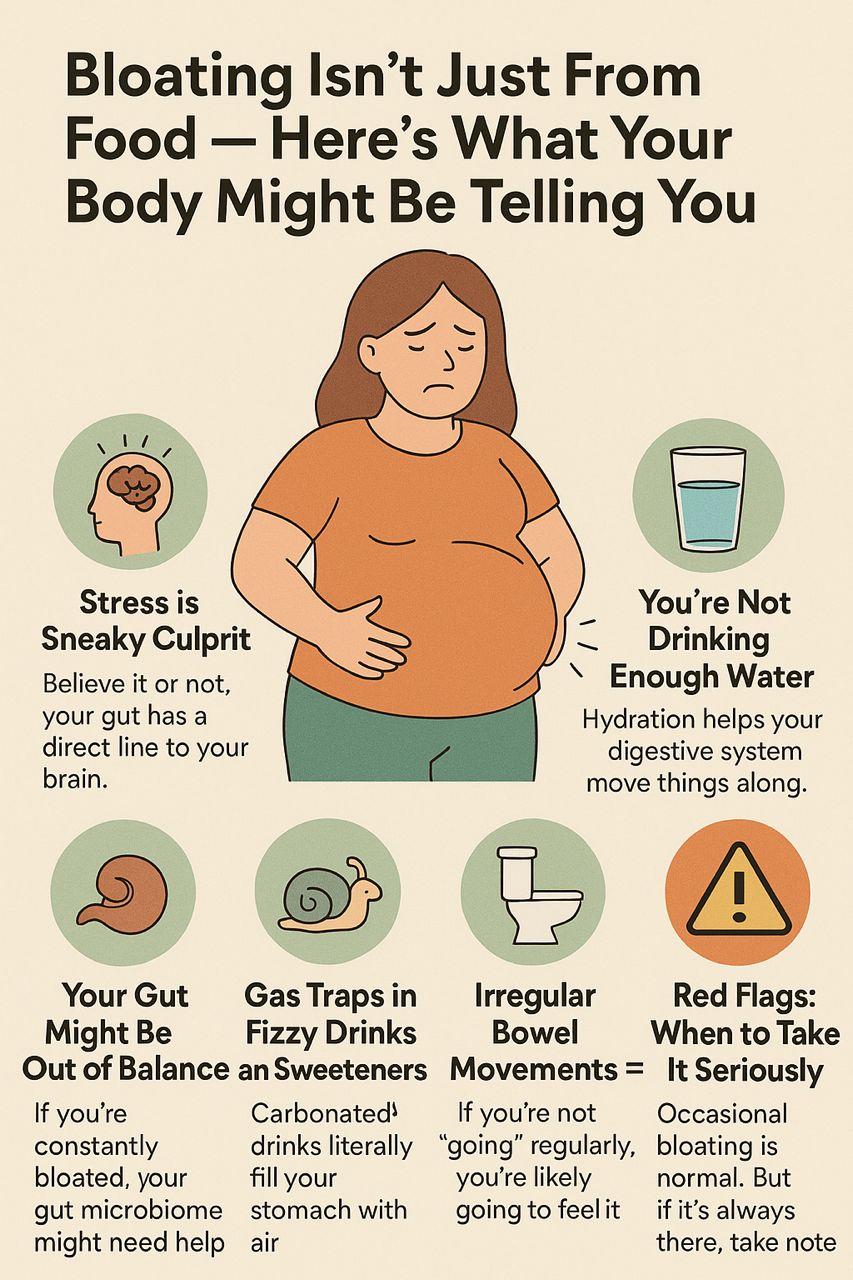“Bloating Isn’t Just From Food — Here’s What Your Body Might Be Telling You”
Ever feel like your tummy turns into a balloon after eating, even when you didn’t overeat?
You’re not alone. Bloating can make you feel uncomfortable, sluggish, and sometimes even embarrassed. While food does play a role, it’s not always the usual suspects like beans or carbonated drinks. Sometimes, your body is trying to tell you something deeper.
Let’s decode the real reasons behind that “why do I feel 6 months pregnant?” belly bloat:
Stress is a Sneaky Culprit
Believe it or not, your gut has a direct line to your brain. When you’re stressed, anxious, or overwhelmed, your digestive system can slow down or spasm, causing bloating. That bloated feeling after a long day might not be from lunch, it might be from life.
You’re Not Drinking Enough Water
Hydration helps your digestive system move things along. When you’re dehydrated, digestion becomes sluggish, leading to constipation and you guessed it;bloating. Aim to sip water throughout the day (not just when you're thirsty).
Your Gut Might Be Out of Balance
If you’re constantly bloated, your gut microbiome might need help. A lack of good bacteria can slow digestion and cause gas buildup. Consider adding fermented foods (like yogurt, kefir, or kimchi) to your meals—or speak to a doctor about probiotics.
Gas Traps in Fizzy Drinks and Sweeteners
Carbonated drinks literally fill your stomach with air. And artificial sweeteners like sorbitol or xylitol (found in sugar-free gum and snacks) can ferment in your gut, causing gas and discomfort. Not all "sugar-free" foods are bloat-free.
Irregular Bowel Movements = A Backed-Up System
If you’re not “going” regularly, you’re likely going to feel it. Constipation can trap gas and make you feel bloated for days. Your gut is like traffic; when there's a hold-up, everything else slows down too.
Red Flags: When to Take It Seriously
Occasional bloating is normal. But if it’s always there, especially with weight loss, fatigue, nausea, or changes in your stool, please don’t ignore it. These could be signs of something more serious like IBS, food intolerances, or even ovarian issues.
Final Thought:
Your body is constantly sending you signals. That bloated belly may be louder than usual, but it’s just trying to get your attention. Listen closely, and treat it with care.
Ever feel like your tummy turns into a balloon after eating, even when you didn’t overeat?
You’re not alone. Bloating can make you feel uncomfortable, sluggish, and sometimes even embarrassed. While food does play a role, it’s not always the usual suspects like beans or carbonated drinks. Sometimes, your body is trying to tell you something deeper.
Let’s decode the real reasons behind that “why do I feel 6 months pregnant?” belly bloat:
Stress is a Sneaky Culprit
Believe it or not, your gut has a direct line to your brain. When you’re stressed, anxious, or overwhelmed, your digestive system can slow down or spasm, causing bloating. That bloated feeling after a long day might not be from lunch, it might be from life.
You’re Not Drinking Enough Water
Hydration helps your digestive system move things along. When you’re dehydrated, digestion becomes sluggish, leading to constipation and you guessed it;bloating. Aim to sip water throughout the day (not just when you're thirsty).
Your Gut Might Be Out of Balance
If you’re constantly bloated, your gut microbiome might need help. A lack of good bacteria can slow digestion and cause gas buildup. Consider adding fermented foods (like yogurt, kefir, or kimchi) to your meals—or speak to a doctor about probiotics.
Gas Traps in Fizzy Drinks and Sweeteners
Carbonated drinks literally fill your stomach with air. And artificial sweeteners like sorbitol or xylitol (found in sugar-free gum and snacks) can ferment in your gut, causing gas and discomfort. Not all "sugar-free" foods are bloat-free.
Irregular Bowel Movements = A Backed-Up System
If you’re not “going” regularly, you’re likely going to feel it. Constipation can trap gas and make you feel bloated for days. Your gut is like traffic; when there's a hold-up, everything else slows down too.
Red Flags: When to Take It Seriously
Occasional bloating is normal. But if it’s always there, especially with weight loss, fatigue, nausea, or changes in your stool, please don’t ignore it. These could be signs of something more serious like IBS, food intolerances, or even ovarian issues.
Final Thought:
Your body is constantly sending you signals. That bloated belly may be louder than usual, but it’s just trying to get your attention. Listen closely, and treat it with care.











